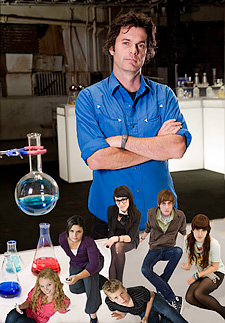Parents of teens have been concerned about a riotous culture developing around adolescents for some time now . much more time than many might imagine:
"What is happening to our young people? They disrespect their elders, they disobey their parents. They ignore the law. They riot in the streets inflamed with wild notions. Their morals are decaying. What is to become of them?" - Aristotle, 4th century BC
"I see no hope for the future of our people if they are dependent on the frivolous youth of today, for certainly all youth are reckless beyond words… When I was young, we were taught to be discreet and respectful of elders, but the present youth are . impatient of restraint." - Hesiod, 8th century BC
 Whatever: The Science of Teens is aware of this tendency to believe that 'the problem with teens' is one that has emerged in recent times and builds its episodes around the search for explanations that have more to do with the enduring physiology of adolescents.
Whatever: The Science of Teens is aware of this tendency to believe that 'the problem with teens' is one that has emerged in recent times and builds its episodes around the search for explanations that have more to do with the enduring physiology of adolescents.
Each episode focuses on a type of behaviour that seemingly distinguishes teens from the rest of the populace: binge drinking, moody behaviour, sexual promiscuity and more. Viewers are introduced to three real adolescents who provide a spectrum of the typical teen approach to the topic. In the first episode on risky behaviour we meet Elias the surfer-boy whose motto is 'you only live once', Saskia the self-described Goth and Peter the petrol-head. Together they give us an appreciation of how common risk-taking is amongst teens, yet how varied its impulses can be. Running parallel to the investigation of their experiences are a series of interviews with Australia's leading neurological and behavioural experts. Whatever then brings the theory and the practice together by having their representative teens participate in a series of experiments designed to illustrate just how the adolescent brain functions.
Whatever has to be congratulated for taking the hype out of reporting on teen behaviour while still retaining maximum interest. It is thoroughly educational while still maintaining the accessibility of popular programs like Catalyst. The experiments are sometimes overly cute - the set dressers couldn't resist test tubes full of coloured water and chintzy static electricity globes - but they are always used as illustrations of much larger, credible studies. Parents in particular will value the insights they provide into the roiling thought processes taking place beneath their progeny's unruly hair.
The one objection I have to Whatever is the same I hold against many science-focussed series. In focussing on the neurological and physiological factors at play during adolescence, Whatever attributes a certain inevitability to teen behaviour that a thinking person might want to question. In the episode on risky practices, for example, host Steve Cannane notes that scientists developing the theory of evolution believe teenage rebellion is part of a biological imperative that drives adolescents out of familiar settings for the purpose of finding genetically suitable mates. The narration concludes:
"So there’s a biological reason for rejecting your parents. It’s natural for adolescents to move away and form their own teen tribes."
Oh? Well that's all right then. But the truth is there are more factors acting on teens than the chemicals in their brains. To begin with the series fails to consider the historical lengthening of adolescence that has taken place over the past century, delaying the advent of adult responsibilities. To its credit Whatever does attempt to deal with other factors like peer pressure and socialisation, though again from the biological perspective. However a human being is not the sum of his or her physical parts. For example researchers might discover a gene that predisposes someone towards highly focussed, even obsessive behaviour, and that could go some way towards explaining why some people are more likely to develop alcoholism or other addictions. But the same genetic predisposition could arguably result in a brilliant pianist or successful entrepreneur.
The difference between animals and humans at this point is the choice we bring to the equation. Rather than simply react to our biological imperatives, human beings possess the ability to consider their circumstances and respond accordingly. Scientists will be quick to point out that the frontal cortex controlling rational thought is still under-developed in teens - useful information for anyone wondering why their young charges don't respond well to the instruction, "Think what you're doing!" However human beings, across culture and time, have possessed another faculty that informs their choices: the conscience. It is scientifically mystifying but observable nonetheless that people of all ages generally display an instinctive awareness of the 'right' and 'wrong' of their behaviour. And we would expect this of a creature made in the image of its Creator.
Whatever is an excellent series full of very helpful information about the wiring of the teenage brain. That understanding should provide the average parent with a better than average chance of communicating with their developing adolescent. However the framework parents will need to help their children understand the world around them will have to come from the architect of our brains.





















